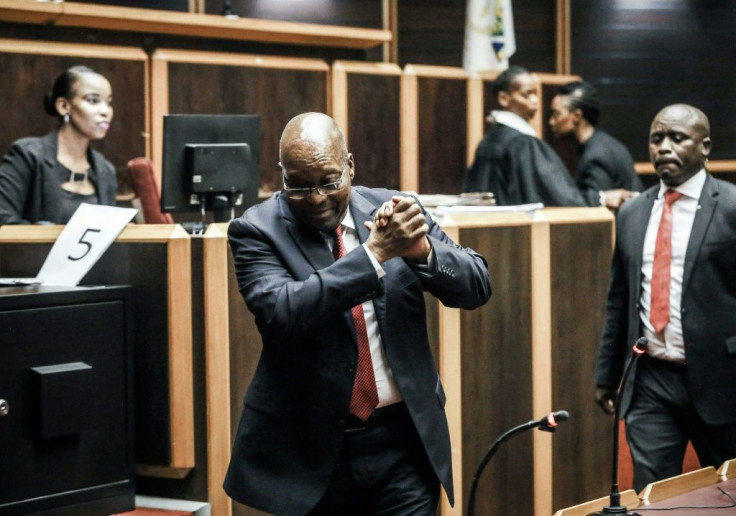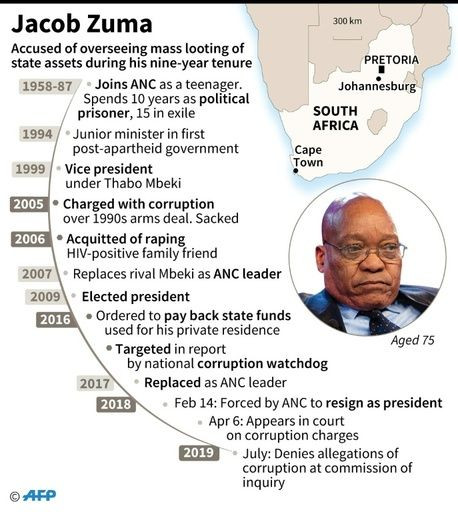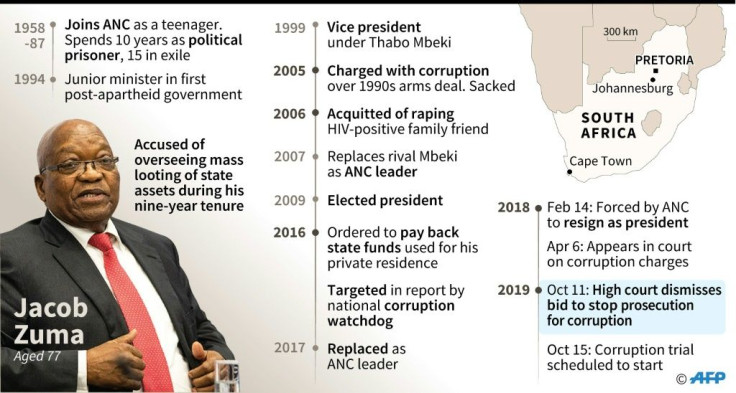S.Africa Court Rules Ex-leader Zuma Must Face Corruption Trial

South Africa's scandal-plagued former president Jacob Zuma will face trial on corruption charges over a 1990s arms deal, a court ruled Friday, in one of multiple alleged graft cases over his long political career.
The court dismissed Zuma's bid for a permanent stay of prosecution over 16 counts of fraud, racketeering and money laundering relating to the multi-billion-dollar arms deal dating back to before he took office in 2009.
Zuma, who was forced to resign last year over separate corruption allegations, has been accused of taking four million rand ($267,000) in bribes from French defence company Thales.
He sought in March to have the case dropped, maintaining it was politically motivated and that a 15-year delay would result in an unfair trial.
But the trial is now scheduled to begin on Tuesday after the High Court, sitting in the southeastern city of Pietermaritzburg, unanimously dismissed Zuma's application, saying it was "anchored on unsound foundation".
In their ruling, the three judges agreed with the prosecution that parts of Zuma's arguments to have the case thrown out were "scandalous and or vexatious".
The prosecution welcomed the decision, saying the trial would be held from October 15 to 18.
However the 77-year-old former leader could still appeal the ruling, experts have suggested.
If it goes ahead, it would be the first time the former leader has stood trial on corruption charges, despite a series of graft allegations against him.

Zuma, who was in court for the ruling on Friday, has yet to respond.
The High Court also dismissed an application by Thales to quash the trial. Both the French firm and the former president deny any wrongdoing.
'Still going to drag'
State lawyer Wim Trengove had argued that if Zuma did not stand trial it gave the impression that he had received special treatment "because he is an important and a powerful man".
He also said Zuma's claims that he was a victim of a "witch hunt" were unfounded.

Zuma is alleged to have taken the bribes during his time as a provincial economy minister and later as deputy leader of the ruling African National Congress (ANC) in the 1990s.
The case has been much delayed -- the charges were first brought against Zuma in 2005. They were dropped by prosecutors in 2009, shortly before Zuma became president, and reinstated in 2016.
The judges blamed both Zuma and the state for the "systemic" delays, saying that "both parties are equally liable as they both participated in the litigation leading to the delay".
However they said they were satisfied that the delays would not prejudice the trial.
Thales said in a statement that it "notes the decision of the High Court" and was assessing its legal options.
South Africa's main opposition party the Democratic Alliance welcomed the court's decision, saying "that Zuma will eventually have to face his day in court".
But political analyst Xolani Dube warned that Zuma could lodge an "urgent" appeal.
"There are also other avenues that the man might still use... he can still appeal so it's still going to drag," Dube told AFP, adding that the country may "not yet see him facing his alleged deeds".
Zuma claimed last year that he was so broke that he had to sell his socks to raise legal fees, after another court ruled he should front the bills.
Other corruption claims
The ruling ANC party forced Zuma to resign over another corruption scandal centred around the wealthy Gupta business family, who won lucrative contracts with state companies and allegedly held sway over his choice of cabinet ministers.
The court's ruling on Friday came just a day after the US Treasury slapped sanctions on the three Indian-born Gupta brothers, calling them a "significant corruption network" that dispersed bribes and misappropriated millions in state funds.
Zuma also appeared before a judicial inquiry in July that is probing allegations he organised a systematic plunder of government coffers in a scandal known as "state capture".
A few days later he pulled out of the inquiry, saying that he had been "treated as someone who was accused". But he later agreed to return at a future date.
Zuma's successor as president, Cyril Ramaphosa, has vowed to tackle corruption in South Africa, which has been led by the ANC since Nelson Mandela came to power in 1994 after the end of apartheid.
© Copyright AFP 2024. All rights reserved.





















